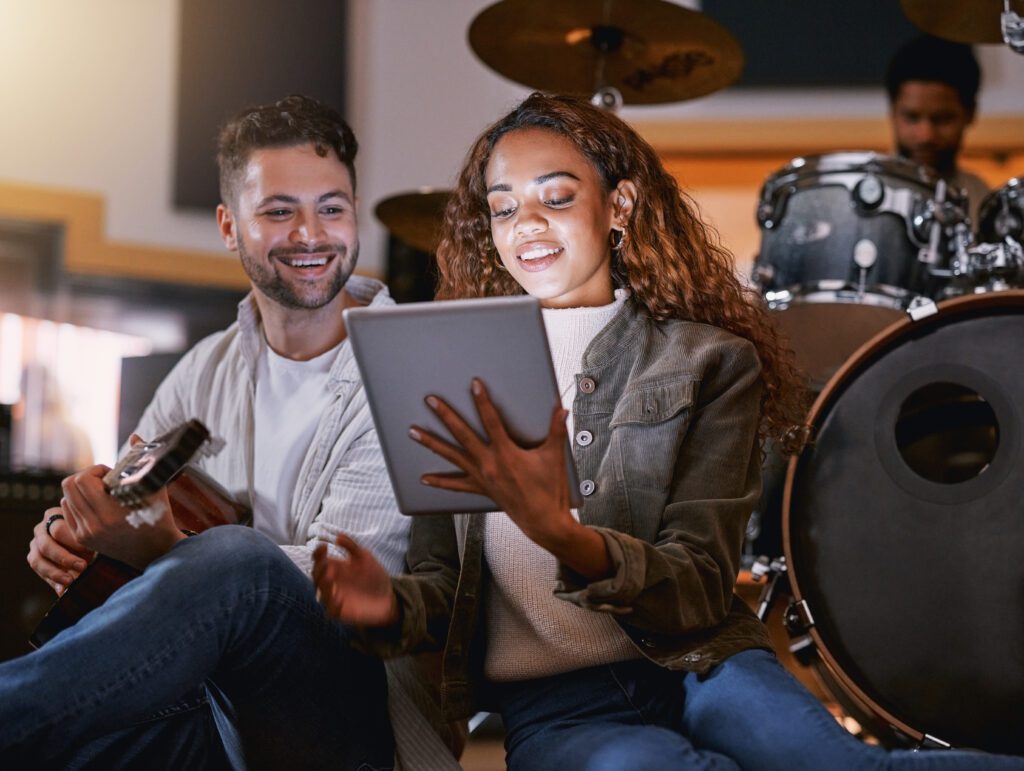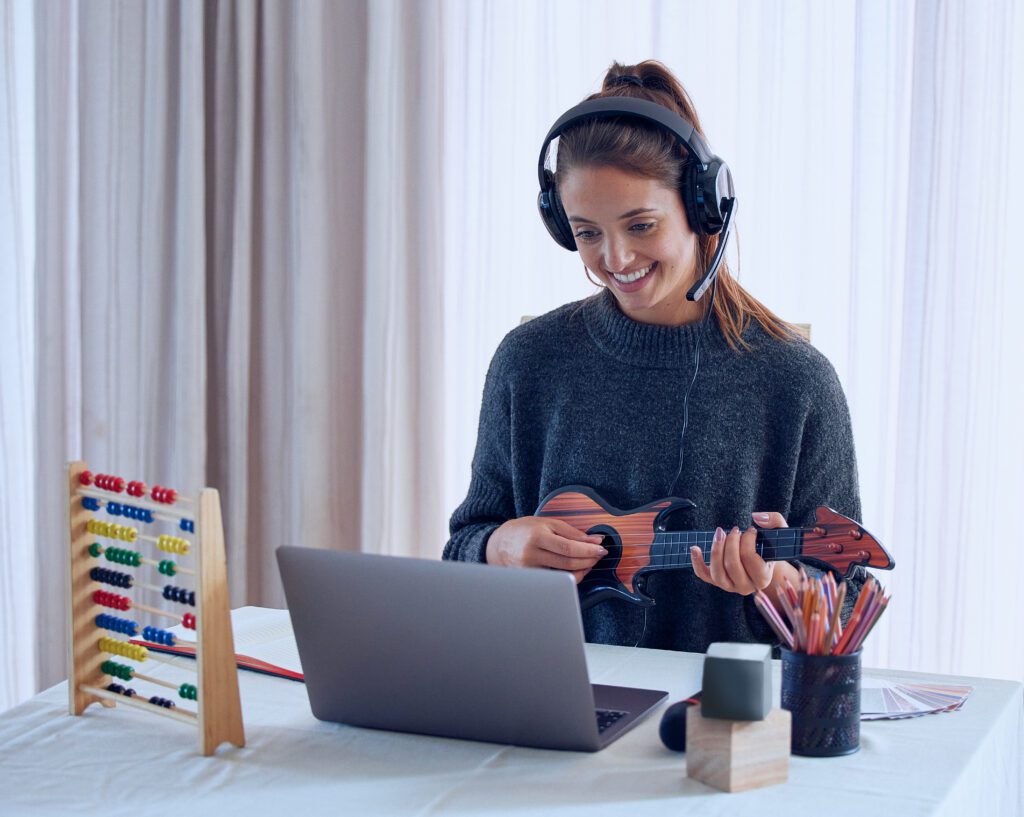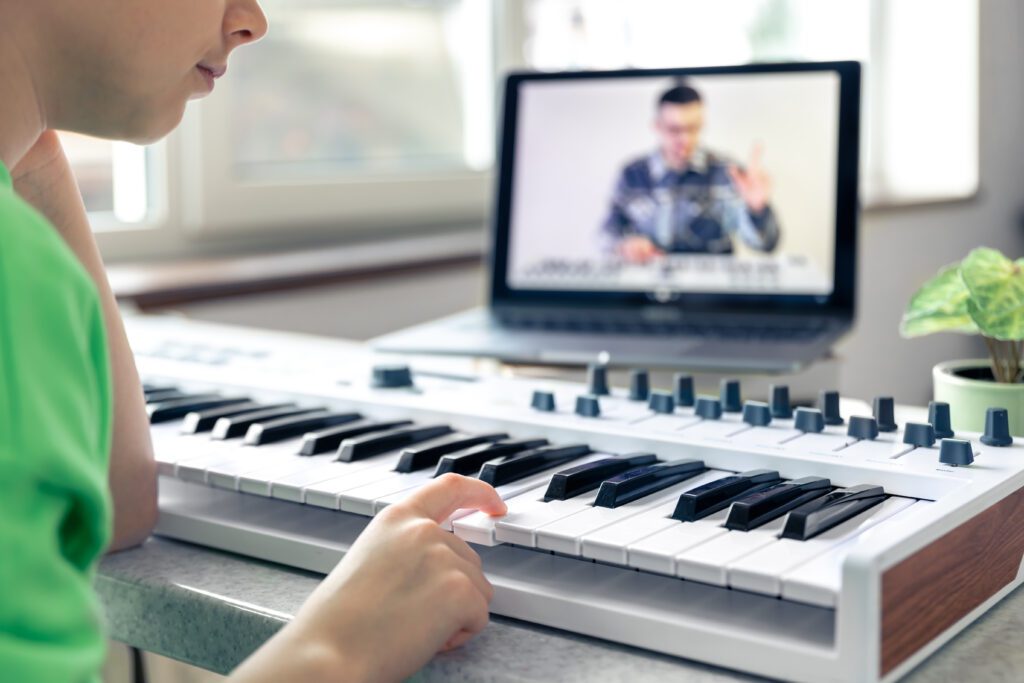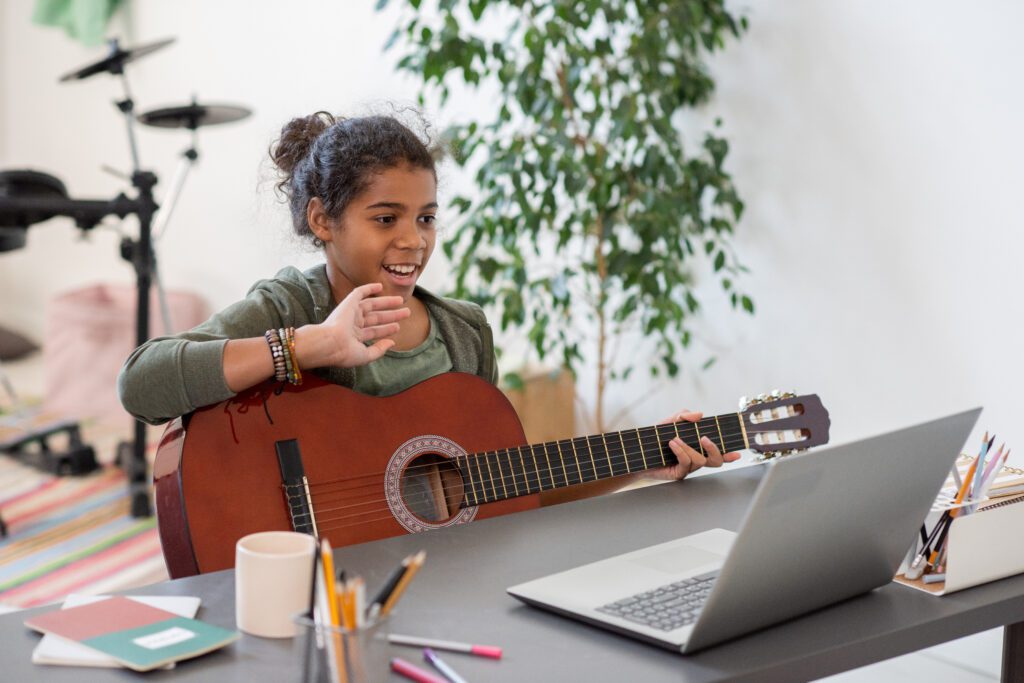How Online Music Lessons Help Beginners Progress Faster
Learning music has always been an exciting yet challenging journey, especially for beginners. Traditionally, aspiring musicians relied on in-person classes, which required traveling, scheduling flexibility, and direct interaction with teachers. However, with the rise of digital education, online music lessons for beginners have become a game-changer.
Today, thousands of students choose online learning to master musical instruments and theory at their own pace. Since technology has made lessons more accessible and interactive, beginners can progress faster than ever before.
But how do online music lessons accelerate learning? Are they really as effective as traditional classes? More importantly, can complete beginners develop solid skills without in-person guidance?
Let’s explore the reasons behind the growing popularity of online music education and how it helps beginners improve more efficiently.
The Benefits of Online Music Lessons for Beginners

Convenience and Accessibility | Learn Anytime, Anywhere
One of the biggest advantages of online music lessons is their unmatched convenience. Unlike traditional classes, which require students to travel to a studio or school, online learning allows them to learn from the comfort of their homes. This flexibility is particularly beneficial for:
- Students with busy schedules who struggle to fit music lessons into their daily routine.
- Adults balancing work and personal commitments while pursuing their musical passion.
- Children and teens who may have multiple extracurricular activities.
- Learners in remote areas with limited access to music schools or experienced teachers.
Additionally, online platforms remove geographical limitations. Previously, students had to rely on local teachers, regardless of their skill level or teaching style. Now, they can access world-class instructors from any part of the world. Whether a student wants to learn from a jazz pianist in New York or a classical violinist in Vienna, online lessons make it possible.
Moreover, online music education accommodates different learning preferences. Some students thrive in live one-on-one lessons, while others prefer self-paced courses with recorded tutorials. Having multiple options ensures that every learner finds a method that suits their needs.
Personalized Learning Pace | Master Each Concept at Your Own Speed
One of the biggest challenges of traditional music classes is the fixed pace. In a group setting, all students must follow the same speed, regardless of individual progress. This approach often leads to two problems:
- Fast learners feel held back because they must wait for others to catch up.
- Slow learners feel pressured and may struggle to keep pace with the class.
Online music lessons solve this issue by offering self-paced learning. Students can:
- Pause and rewind tutorials as many times as needed.
- Spend extra time on difficult concepts without feeling rushed.
- Skip ahead if they find certain topics too easy.
For example, a beginner struggling with finger coordination on the piano can repeatedly watch hand position tutorials until they feel comfortable. On the other hand, someone who already understands basic chords can move on to advanced progressions without waiting for an instructor’s approval.
Additionally, many online platforms provide progress-tracking tools. These tools help students monitor their improvement over time, identify weak areas, and set realistic goals. The ability to visualize progress keeps learners motivated and focused.
A Rich Variety of Learning Resources | More Than Just Lessons
Online music education is not limited to live video lessons. Many platforms offer a wide range of supplementary materials, making learning more engaging and effective. These include:
- Step-by-step video tutorials with detailed explanations.
- Printable sheet music and chord charts for independent practice.
- Interactive apps that provide instant feedback on playing accuracy.
- Backing tracks and play-along recordings to develop timing and rhythm.
- Music theory games and quizzes to reinforce key concepts.
Unlike traditional lessons, where students rely solely on teacher instructions, online music courses give learners 24/7 access to learning materials. This means students can review lessons anytime, ensuring continuous progress.
Additionally, some platforms incorporate gamification, turning learning into a fun and interactive experience. For example, apps like Yousician and Simply Piano use real-time feedback, points, and badges to keep students engaged. This playful approach encourages consistent practice, making learning enjoyable instead of feeling like a chore.
Affordability | Quality Music Education Without the High Costs
Music lessons can be expensive, especially when considering:
- Hourly tuition fees for in-person classes.
- Travel expenses to and from lessons.
- Instrument rental or purchase costs.
Online music lessons are often more affordable because they eliminate many of these additional costs. Many platforms offer:
- Monthly or annual subscriptions at a fraction of traditional lesson fees.
- One-time payment courses with lifetime access.
- Free trial periods so students can explore courses before committing.
This affordability makes quality music education accessible to a wider audience, ensuring that financial constraints do not prevent someone from pursuing their passion.
Faster Skill Development with Structured Online Programs

Step-by-Step Curriculum | A Clear Path to Progress
One reason online music lessons help beginners progress quickly is their structured approach. Unlike self-teaching methods, which often lack direction, professional online courses follow a carefully designed curriculum. A typical structured program includes:
- Basic music theory (notes, rhythm, scales, and key signatures).
- Technical exercises to develop finger strength and coordination.
- Repertoire selection tailored for gradual skill improvement.
This step-by-step progression ensures students build a strong foundation before moving to advanced concepts. Instead of feeling overwhelmed, they develop skills in a logical sequence, leading to steady and measurable improvement.
Instant Feedback & Progress Tracking | Correct Mistakes Immediately
In traditional lessons, students rely on weekly feedback from instructors. If they practice incorrectly between sessions, bad habits may form without correction. Online music lessons address this issue with instant feedback tools.
Many platforms use AI-driven analysis to detect:
- Incorrect notes and timing.
- Improper hand positioning.
- Weak dynamics or inconsistent rhythm.
By receiving real-time corrections, students can fix mistakes immediately, preventing the formation of poor technique. This feature accelerates progress, as learners refine their skills faster than those relying solely on teacher feedback.
Live Sessions & Pre-Recorded Lessons | The Best of Both Worlds
Online music lessons typically fall into two categories:
- Live one-on-one sessions with an instructor.
- Pre-recorded lessons available anytime.
Both methods have unique benefits:
- Live lessons provide real-time interaction and personalized guidance.
- Pre-recorded courses allow students to revisit material at their own pace.
A combination of both creates a blended learning approach, ensuring maximum flexibility and effectiveness.
Interactive and Engaging Learning Experience

Virtual Jam Sessions & Online Music Communities
Music is meant to be shared, and online platforms foster community engagement through:
- Virtual jam sessions where students play together remotely.
- Discussion forums to share experiences and seek advice.
- Group challenges and competitions to keep motivation high.
Being part of an online music community encourages students to practice regularly, receive support, and stay inspired.
Gamification & AI-Based Learning Tools
Many platforms integrate game elements into lessons, such as:
- Score-based challenges to improve accuracy.
- Interactive exercises with real-time feedback.
- Level-up systems to track progress.
These features make learning fun and rewarding, ensuring students stay engaged and motivated.
Overcoming Common Challenges in Learning Music Online

Online music lessons provide countless benefits, but like any learning method, they come with challenges. Beginners may struggle with staying motivated, maintaining discipline, and ensuring proper technique without direct physical guidance. However, these obstacles can be easily overcome with the right strategies.
Staying Motivated and Avoiding Burnout
Motivation plays a crucial role in learning any skill, and music is no exception. Some students may start with enthusiasm but lose interest over time, especially when facing difficult techniques or slow progress. To stay engaged, online learners can:
- Set short-term and long-term goals: Defining clear milestones, such as learning a new song every month or mastering a scale in two weeks, keeps motivation high.
- Join online music communities: Interacting with other learners, sharing progress, and participating in virtual challenges create accountability and encouragement.
- Practice with backing tracks and real songs: Playing along with favorite songs makes practice more enjoyable than repetitive exercises.
- Mix up learning methods: Instead of sticking to a single learning style, students can explore interactive apps, video tutorials, and live online sessions.
Ensuring Proper Technique Without a Physical Instructor
One of the biggest concerns beginners have about online music lessons is learning the correct technique without an instructor physically guiding their hands, posture, or breath control. However, modern technology has made it easier to develop good habits remotely.
To ensure proper technique, beginners can:
- Use AI-driven apps: Many platforms now offer real-time feedback on posture, hand positioning, and note accuracy.
- Record practice sessions: Watching playback helps identify mistakes that might go unnoticed while playing.
- Follow detailed video tutorials: High-quality instructional videos break down techniques step by step, allowing students to pause and rewind when necessary.
- Schedule periodic live lessons: Even if most learning is done through pre-recorded lessons, occasional live sessions with an instructor can provide valuable corrections.
Building Discipline and a Consistent Practice Routine
Self-discipline is another challenge in online learning. Without a fixed schedule, some beginners struggle to practice regularly. To develop consistency:
- Set a dedicated practice time each day and treat it like an official class.
- Use structured lesson plans to stay on track.
- Break sessions into small chunks (e.g., 20–30 minutes per day) rather than long, overwhelming practice hours.
- Keep a practice journal to track progress and maintain motivation.
By addressing these challenges, online learners can maximize their progress while enjoying the benefits of digital music education.
The Role of Technology in Enhancing Online Music Education

Technology has transformed online music education, making it more interactive, accessible, and engaging than ever before. From AI-powered apps to virtual reality, digital tools have revolutionized how beginners learn music.
AI-Powered Learning Platforms: Instant Feedback for Faster Improvement
Artificial Intelligence (AI) has significantly enhanced online music lessons by providing real-time feedback on a student’s performance. AI-based tools analyze a student’s playing or singing and offer corrections on:
- Pitch and intonation for vocalists and instrumentalists.
- Timing and rhythm accuracy to improve musical flow.
- Hand positioning and technique for piano, guitar, violin, and other instruments.
For example, apps like Yousician, Flowkey, and Simply Piano listen to students play and provide instant suggestions, much like a human instructor would. This accelerates progress by allowing students to fix mistakes immediately rather than waiting for their next lesson.
Virtual and Augmented Reality: The Future of Music Education
While still in the early stages, virtual reality (VR) and augmented reality (AR) are shaping the future of online music education. These technologies create immersive learning experiences, such as:
- Virtual piano keyboards that help students visualize notes and chords.
- AR-powered guitar tuners that guide beginners in tuning their instruments with real-time overlays.
- VR music studios where students can interact with virtual instruments and instructors in a 3D environment.
These innovations make learning more engaging and provide an experience that closely mimics in-person lessons.
Smart Devices and Interactive Practice Tools
From digital metronomes to AI-powered tuners, technology has introduced smart practice tools that improve learning efficiency. Some of the most popular tools include:
- Smart keyboards and guitars that light up keys or frets for guided learning.
- Looping software that allows students to slow down difficult sections of a song for better practice.
- Online collaboration tools that enable real-time jamming and duet performances with other students.
These advancements bridge the gap between traditional and online learning, making digital music education more effective than ever.
Why Online Music Lessons Are the Future of Learning

Online music lessons are not just a trend—they are rapidly becoming the preferred way to learn music for beginners and experienced musicians alike. Here’s why digital learning is shaping the future of music education.
Global Accessibility | Learning Without Boundaries
One of the most significant advantages of online music education is its ability to connect students and teachers across the world. Unlike traditional lessons, which depend on local availability, online platforms allow learners to:
- Find expert instructors from any location.
- Access diverse teaching styles and musical genres beyond what’s available locally.
- Participate in international masterclasses and workshops.
This global accessibility opens doors to a richer and more varied learning experience.
The Rise of Hybrid Learning Models
Many music schools and private instructors are now adopting hybrid learning models, which combine online and in-person lessons. This model provides the best of both worlds, allowing students to:
- Take theory lessons online while attending practical sessions in person.
- Use online tutorials for self-paced practice between live lessons.
- Join virtual rehearsals and online music collaborations while maintaining a local music community.
As more educators recognize the benefits of online tools, hybrid learning is becoming the new standard in music education.
Cost-Effective and Scalable Learning
Compared to traditional lessons, online music education is:
- More affordable due to lower operational costs.
- Easier to scale, allowing instructors to reach more students.
- More inclusive, making high-quality music education accessible to those with financial or geographical limitations.
As digital learning continues to evolve, the quality and effectiveness of online music lessons will only improve.
Why Online Music Learning is the Best Choice for Beginners

The world of music education has evolved significantly, making it easier for beginners to develop their skills efficiently. With the rise of digital learning, students now have access to high-quality lessons, expert guidance, and flexible schedules that fit their needs. Let’s break down why online music lessons help beginners progress faster than traditional methods.
1. Structured Learning Ensures Steady Progress
One of the biggest advantages of online music lessons is the availability of structured learning paths. Unlike traditional lessons, where progress can depend on a teacher’s availability, online learning platforms offer:
✔ Step-by-step lesson plans that guide students through each stage of learning.
✔ Interactive exercises and quizzes to reinforce concepts effectively.
✔ AI-powered feedback that helps correct mistakes in real time.
Because of this structured approach, beginners can develop strong foundational skills faster and move ahead with confidence.
2. Flexible and Convenient Learning for Faster Improvement
Another major benefit of online music lessons is flexibility. Beginners no longer have to adjust their schedules to fit into a music teacher’s availability. Instead, they can:
✔ Access lessons anytime, anywhere, ensuring consistency in practice.
✔ Choose between pre-recorded courses or live classes based on their preference.
✔ Practice at their own pace, allowing for better retention and mastery.
Since learning music requires regular practice and repetition, the ability to access lessons on demand ensures that students stay on track and improve steadily.
3. Cost-Effective Learning Without Sacrificing Quality
Traditional music lessons can be expensive, making them less accessible to many beginners. Fortunately, online music lessons help beginners progress faster without the high costs of in-person classes. Here’s why they are more affordable:
✔ Subscription-based plans offer unlimited lessons at a fraction of the price.
✔ No transportation costs, since all learning happens from home.
✔ Free and low-cost resources, such as apps and online communities, provide additional support.
By reducing financial barriers, online music lessons make it possible for more students to receive quality music education without overspending.
4. Overcoming Challenges With Smart Learning Strategies
Although online learning requires self-discipline, students can stay motivated and on track by using the right strategies:
✔ Setting short-term and long-term goals helps maintain focus.
✔ AI-driven learning tools provide instant feedback to correct mistakes.
✔ Recording and reviewing practice sessions allows for self-assessment and improvement.
✔ Joining online music communities offers encouragement and peer support.
With these effective strategies, beginners can stay engaged and continue progressing without feeling overwhelmed.
5. The Future of Music Education is Online
As technology continues to advance rapidly, online music education is becoming even more interactive and highly personalized. From AI-driven instruction to virtual reality music training, digital platforms are constantly evolving, shaping the future of learning in exciting ways. Since online music lessons help beginners progress faster, they are now quickly becoming the top choice for aspiring musicians worldwide.
With real-time feedback, highly flexible scheduling, and incredibly cost-effective courses, there has never been a better time to start learning music online. Whether you’re looking to play an instrument, improve your vocals, or gain a deeper understanding of music theory, the online learning revolution is here to stay. Moreover, with so many innovative tools available, students can now enjoy an engaging, structured, and highly effective way to develop their musical talents.
So, if you’re eager to start your musical journey, explore a wide range of online music lessons at The Mystic Keys, where expert instruction and interactive learning make progress even faster.
For more information and exciting resources about learning music, visit our website at The Mystic Keys. For more music content and exciting offers follow us on
Facebook, Instagram, YouTube, LinkedIn, Twitter, Pinterest, Reddit, Threads, and Quora.








